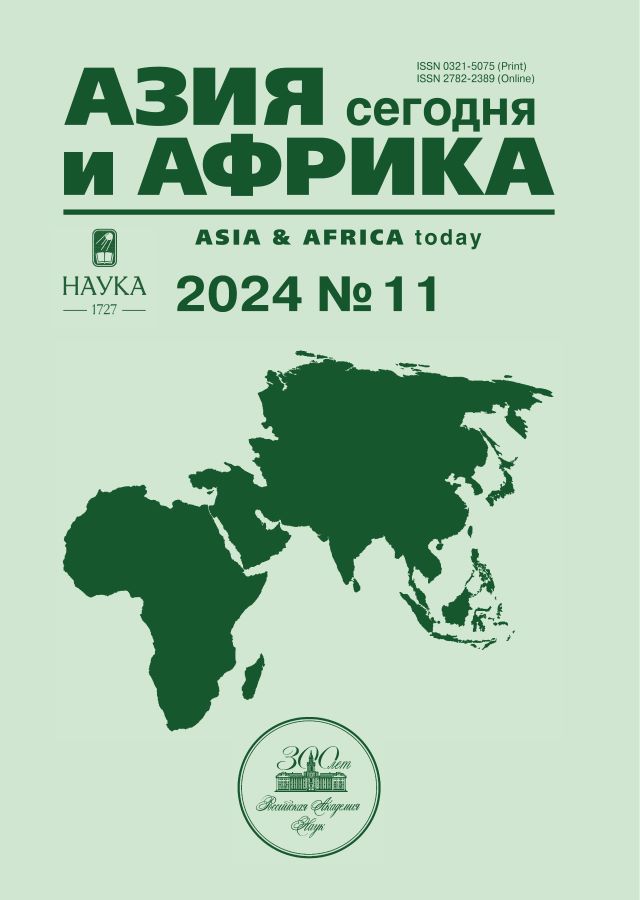Abul Kalam Azad and Ethno-Confessional Nationalism: Political Activity and Religious and Philosophical Quest
- Autores: Gepalov A.M.1
-
Afiliações:
- P.P. Semenov-Tyan-Shansky Lipetsk State Pedagogical University
- Edição: Nº 11 (2024)
- Páginas: 57-63
- Seção: Political portrait
- URL: https://consilium.orscience.ru/0321-5075/article/view/647482
- DOI: https://doi.org/10.31857/S0321507524110077
- ID: 647482
Citar
Texto integral
Resumo
The purpose of the article is to analyze the political activities and religious and philosophical views of an outstanding figure of the Indian national movement, one of the leaders of the influential Indian National Congress Party, its president during World War II, a staunch Muslim Abul Kalam Azad (1888-1958) in the context of the problem of ethnic and confessional nationalism in India. Azad was an implacable fighter for the unity of India and an opponent of its partition. Together with Jawaharlal Nehru, he was the creator of the theory of Indian nationalism the entire population of Hindustan is one people. Azad believed that large political associations (states) were the most progressive, and humanity, sooner or later, would come to realize its unity. He believed that there were more similarities than differences in different religions, and considered Islam to be a religion of freedom. Using Indian and domestic sources and research, the author characterizes one of the least studied Indian politicians and thinkers in our country, an associate of Mahatma Gandhi, an opponent of the disintegration of the country along religious and confessional lines in 1947.
Palavras-chave
Sobre autores
Alexander Gepalov
P.P. Semenov-Tyan-Shansky Lipetsk State Pedagogical University
Autor responsável pela correspondência
Email: museum48@mail.ru
ORCID ID: 0000-0002-7416-2120
Post-graduate student; Director, Lipetsk Regional Museum of Local Lore
Lipetsk, RussiaBibliografia
- Desai M. Maulana Abul Kalam Azad. The President of the Indian National Congress. Agra: Shiva Lal Agarwala, 1946. P. 146.
- Iftikhar A. 2016. The Role of Maulana Abul Kalam Azad in National Movement. 3rd International Conference on Multidisciplinary Research &Practice. International Journal of Research and Scientific Innovation. Vol. IV. Iss. I, рр. 468-471.
- Азад А.К. Индия добивается свободы. Москва: Издательство иностранной литературы, 1961. 348 с.
- Ramachandra Rao P.R. Tribunes of the People. Bombay: New Book Company, 1945.
- Brief History of Maulana Azad Prepared by the Government of India, Home Department Political, in 1936. The Selected Works of Maulana Abut Kalam Azad. Vol. I (1936-42). Ed. by R. Kumar. New Delhi: Atlantic Publisher and Disrtibution, 1991. P. 307.
- Алаев Л.Б., Вигасин А.А., Сафронова А.Л. История Индии. Москва: ГАУГН-Пресс, 2018. 544 c.
- Поддубный В.К. Формирование индийского федеративного национального государства в эпоху национальноосвободительного движения: истоки, особенности и результаты, 1921-1947 гг. Владимир: Владимирский государственный педагогический университет, 2007. 328 c.
- Черешнева Л.А. «Августовская революция» 1942 г. в Индии. Москва: ИНИОН РАН, 2007. 202 с.
- Левин З.И. Развитие общественной мысли на Востоке. Колониальный период. XIX-XX вв. Москва: Наука, 1993. 245 с.
- Azad A.K. The Tarjuman al-Koran. Vol. I. Ed. by Syed Abdul Latif. Hyderabad: Shadi Khana, 1981. р. 254.
- Latif S.A. Foreword to the Еranslationюю. Azad A.K. The Tarjuman al-Koran. Vol. I. Ed. by Syed Abdul Latif. Hyderabad: Shadi Khana, 1981. Pp. xiii-xxi.
- Алиев А.А. 2009. Ислам и национализм (исламская парадигма в концепциях современной мусульманской государственности). Россия и современный мир. № 2, с. 187-204.
- Saiyidain, Hameeda Syeda. Maulana Azad Islam and the Indian National Movement. New Delhi: Oxford University Press, 2014. Р. 292.
- Игнатенко А.А. 2009. «Божественное» и человеческое в исламе. Исламоведение. № 1, с. 57-77.
- Игнатенко А.А. 2007. Ислам в XXI веке: главные направления исследований. Полития. № 4(47), с. 4-29.
- Черешнева Л.А. 2016. Южноазиатский урок. Гуманитарные исследования Центральной России. Вып. 1, с. 54-59.
Arquivos suplementares










